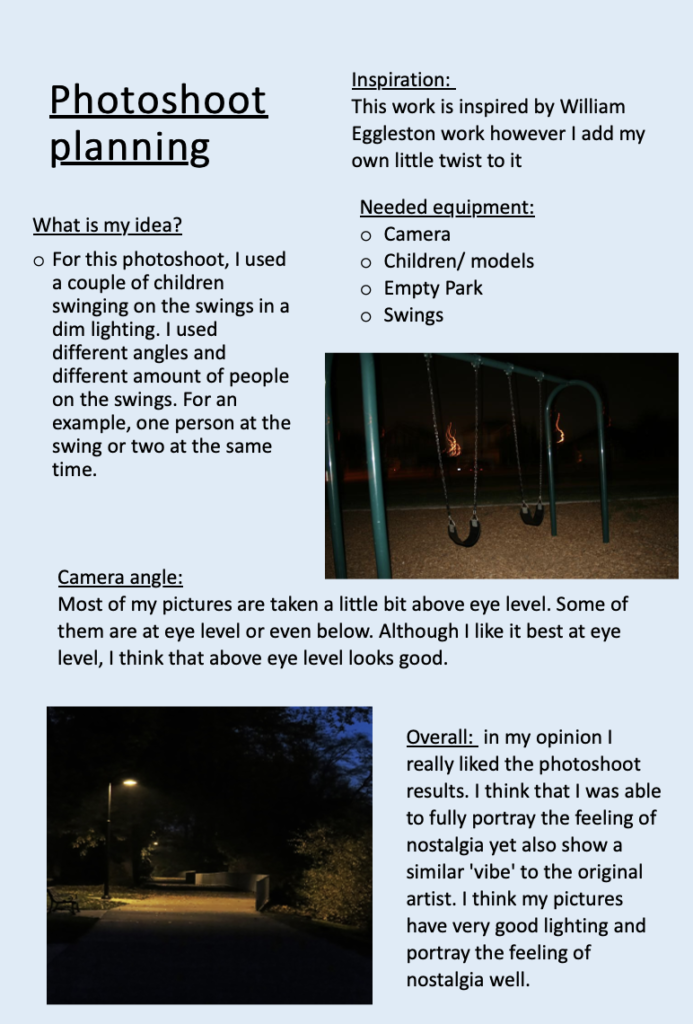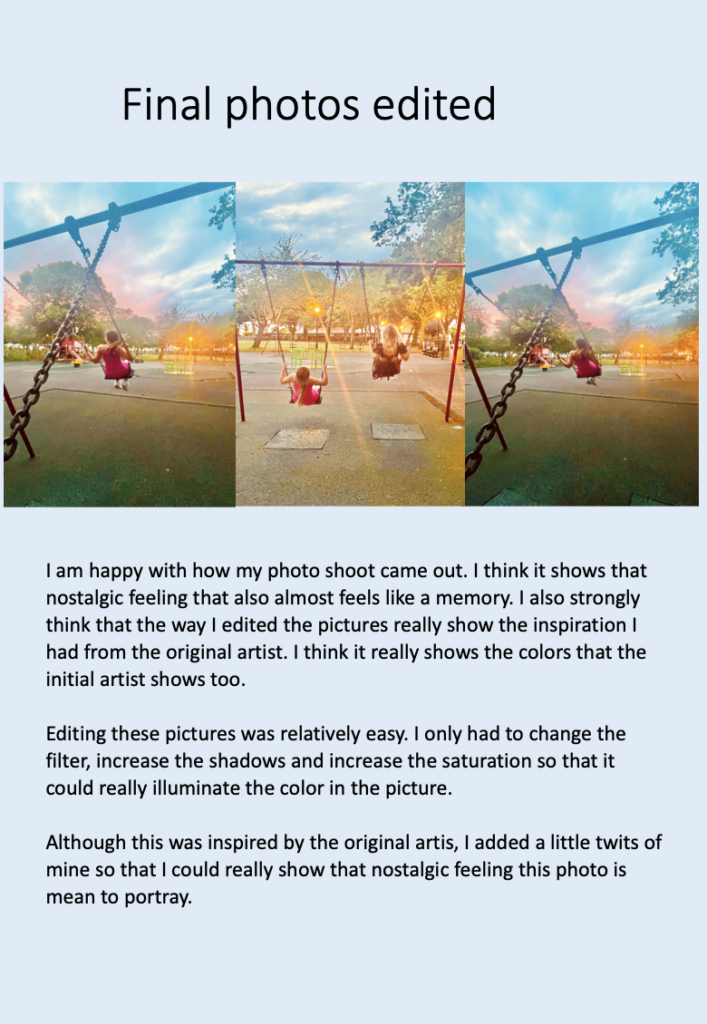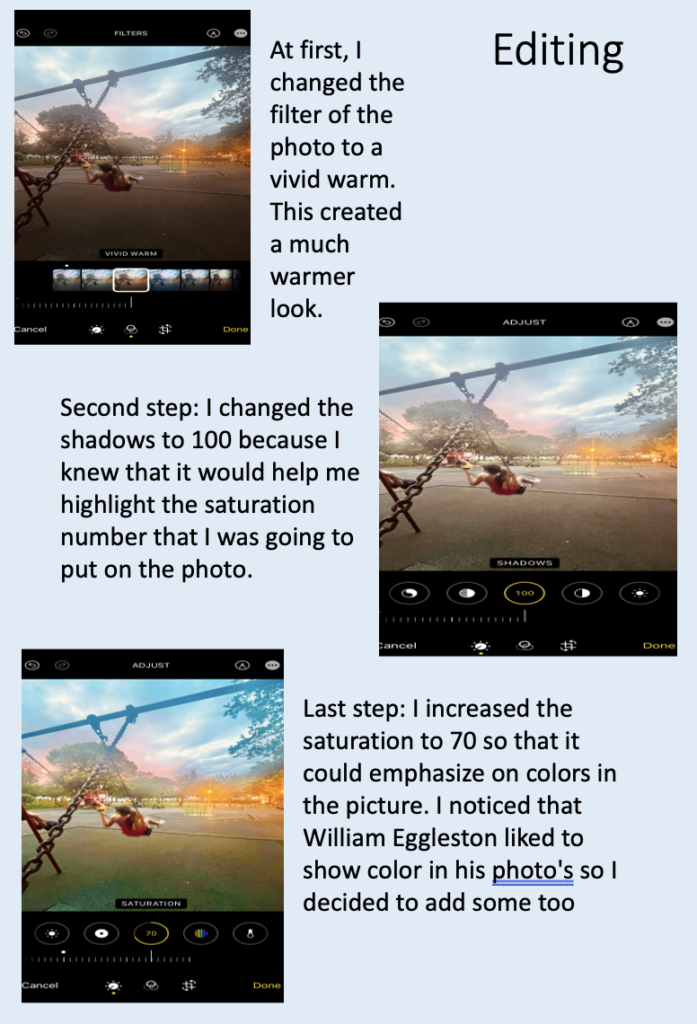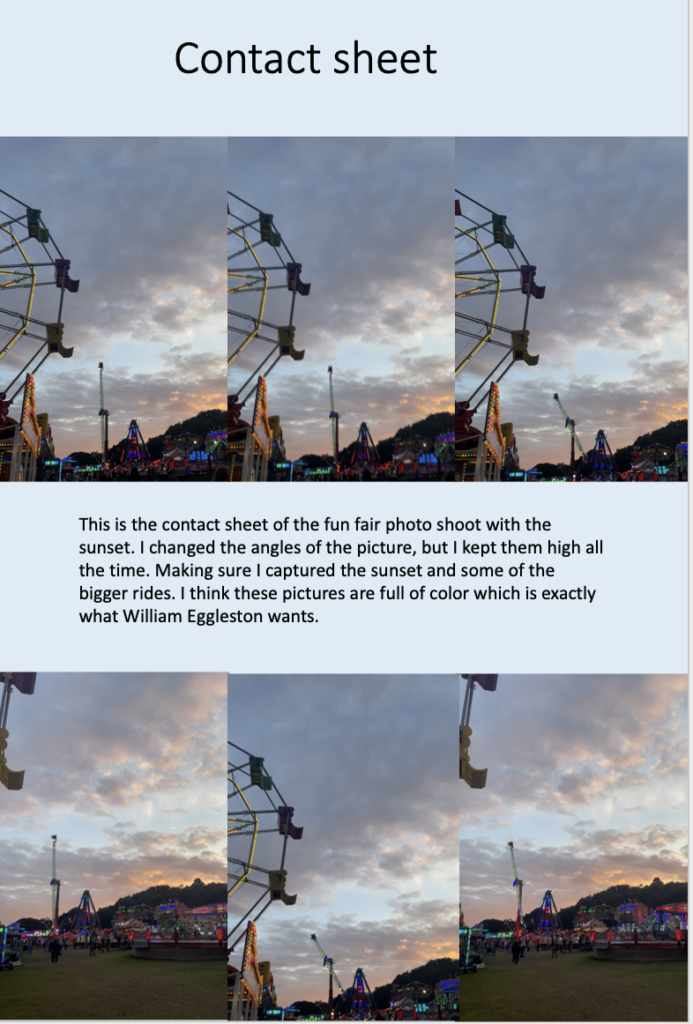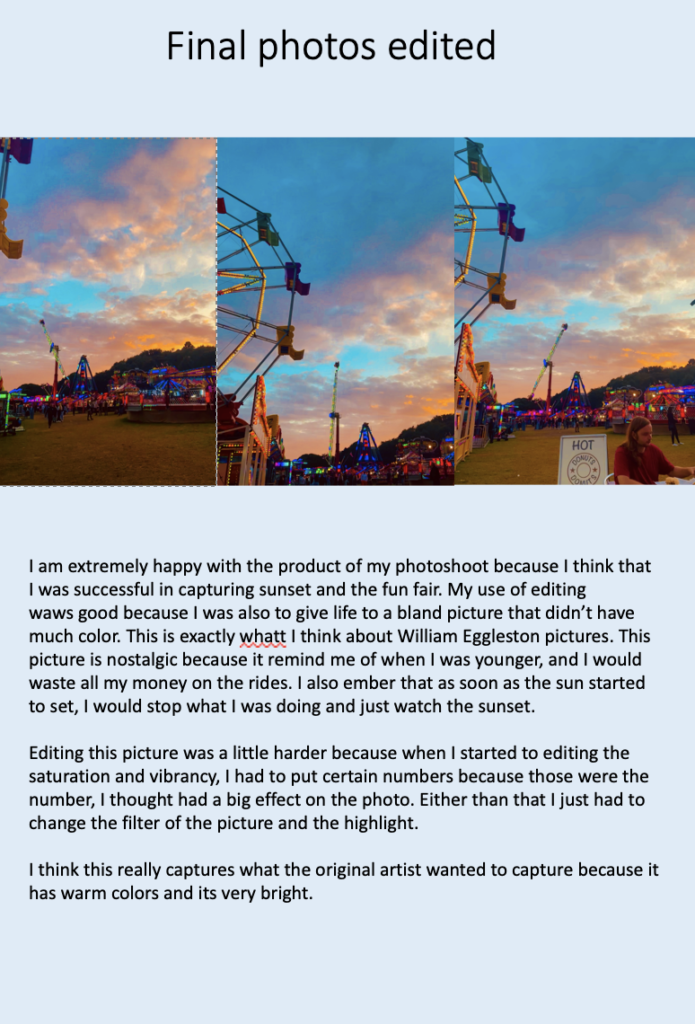Daily Archives: 15 September 2023
Filters
Photography Quiz
Nostalgia
A-Level Photography Knowledge Quiz
Q1: What is the etymology (origin & history) of the word photography?
Writing with light
Q2: What year was the first photograph made in camera?
1826 (Joseph Nicéphore Niépce)
Q3: When did the first photograph of a human appear?
1838 (Louis-Jacques-Mandé Daguerre)
Q4: Who made the first ‘selfie’?
Robert Cornelius (1839)
Q5: When did the first colour photograph appear?
1861 (James Clerk Maxwell)
Q6: What do we mean by the word genre?
A style or category of art
Q7: What do we mean by the genre of still-life?
An image that shows inanimate objects from the natural or man-made world.
Q8: What was the main purpose of the Pictorialist movement?
To affirm photography as an art form
Q9: How do we describe the term documentary photography?
Capture images that truthfully portray people, places and events.
Provide in-depth information about a subject over a long period time.
An interpretation of reality as witnessed by the photographer.
Q10: What is exposure in photography?
The amount of light that reaches your camera’s sensor.
Q11: What controls exposure on your camera?
Aperture, shutter speed, ISO.
Q12: What control on our camera records moving objects?
Shutter.
Q13: How do we explain depth of field?
How much of your image is in focus.
Q14: What factors affect Depth of Field?
Lens aperture, distance from camera to subject, and lens focal length.
Q15: What is composition in photography?
The arrangement of visual elements within the frame.
Q16: What is your understanding of aesthetics in art?
Concerned with the nature of beauty and taste.
It is subjective and in the eye of the beholder.
Aesthetic qualities refer to the way and artwork looks and feels.
Making a critical judgement based on observation and understanding.
Q17: What are contextual studies in photography?
To provide historical, cultural and theoretical understanding of images.
Q18: How many images are captured on average every day worldwide?
4.7 billion
Q19: Which portrait is the most reproduced in the world?
The Queen (Elizabeth II)
Photography Summer Task






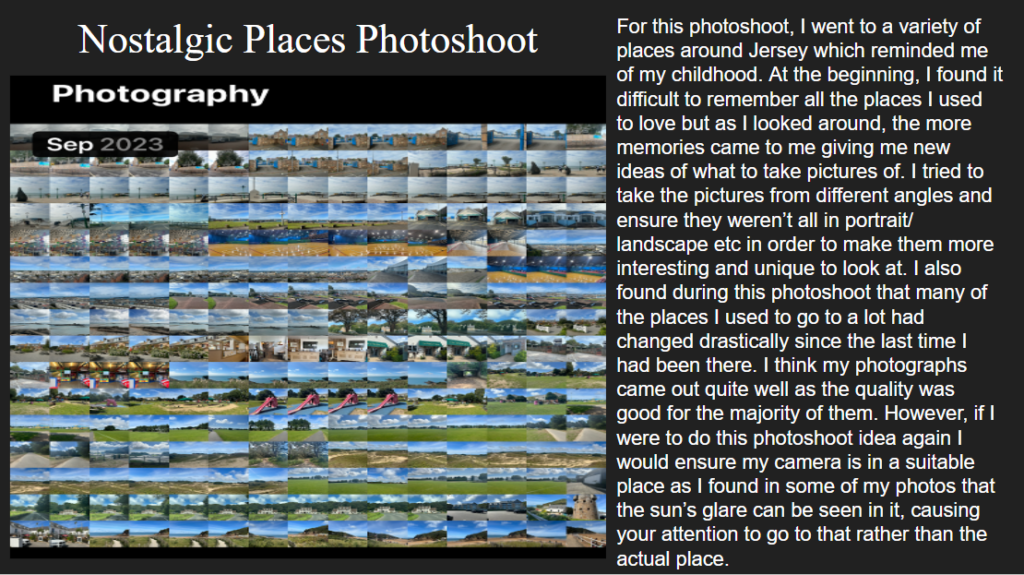





Introduction to A-Level Photography Quiz
Q1

What is the etymology (origin & history) of the world photography?
A: Writing with light
Q2

What year was the first photograph made in camera?
A: 1826 (Joseph Nicéphore Niépce)
Q3

When did the first photograph of a human appear?
A: 1838 (Louis-Jacques-Mandé Daguerre)
Q4

Who made the first ‘selfie’?
A: Robert Cornelius (1839)
Q5

When did the first colour photograph appear?
A: 1861 (James Clerk Maxwell)
Q6

What do we mean by the word genre?
A: A style or category of art
Q7

What do we mean by the genre of still-life?
A: An image that shows inanimate objects from the natural or man-made world
Q8

What was the main purpose of the Pictorialist movement?
A: To affirm photography as an art form
Q9

How do we describe the term documentary photography?
A: Capture images that truthfully portray people, places and events
Q10

What is exposure in photography?
A: The amount of light that reaches your camera’s sensor
Q11

What controls exposure on your camera?
A: Aperture, shutter speed, ISO.
Q12

What control on our camera records moving objects?
A: Shutter
Q13

How do we explain depth of field?
A: How much of your image is in focus
Q14

What factors affect Depth of Field?
A: Lens aperture, distance from camera to subject, and lens focal length.
Q15

What is composition in photography?
A: The arrangement of visual elements within the frame.
Q16

What is your understanding of aesthetics in art?
A: Concerned with the nature of beauty and taste. It is subjective and in the eye of the beholder. Aesthetic qualities refer to the way and artwork looks and feels. Making a critical judgement based on observation and understanding.
Q17

What are contextual studies in photography?
A: To provide historial, cultural and theoterical understanding of images.
Consider factors outside of the image, as well as inside the frame.
Q18

How many images are captured on average every day worldwide?
A: 4.7 billion
Q19

Which portrait is the most reproduced in the world?
A: The Queen (Elizabeth II)
Still Life – Photoshoot

This is a print screen of all of the photographs I took in my photoshoot. I experimented with different lights, making the temperature warm and cool. I positioned the objects in different places to have a variety of photos. The objects I used for this still life shoot were nostalgic as the teddy is a childhood toy which has memories connected, the polaroid can be seen as nostalgic since, even though is is a recent photo, polaroid’s are old, lastly, the tin box could symbolise a time capsule holding nostalgic memories.
The photos below are some of my strongest photographs from this photoshoot.



Simple Editing to enhance my strongest photo:
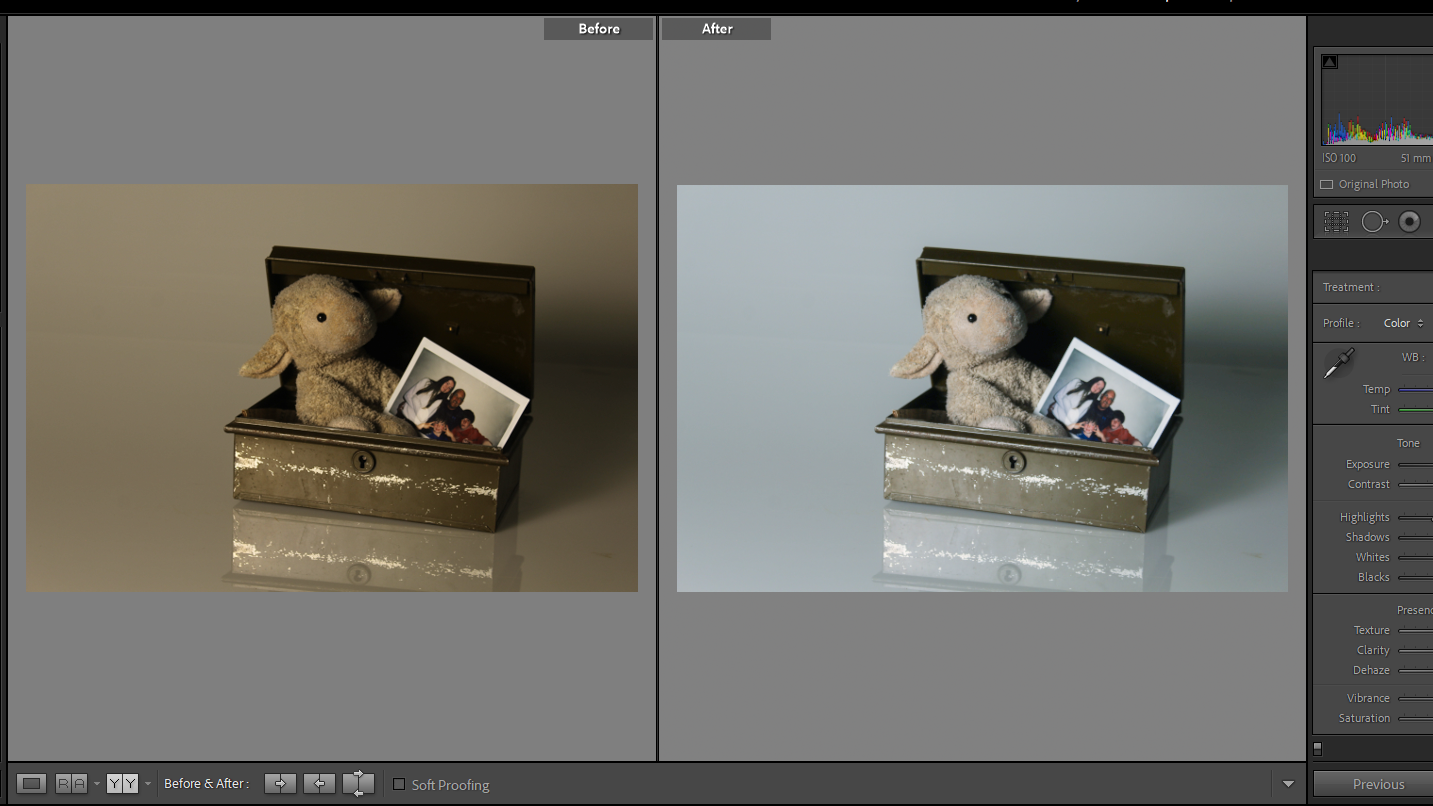
This is a screen screenshot of the before and after of a photo from this shoot that I edited in Lightroom. I brightened the image and increased highlights. I also adjusted the tone curves to dull down certain colours.
This is the final image:

Summer Homework


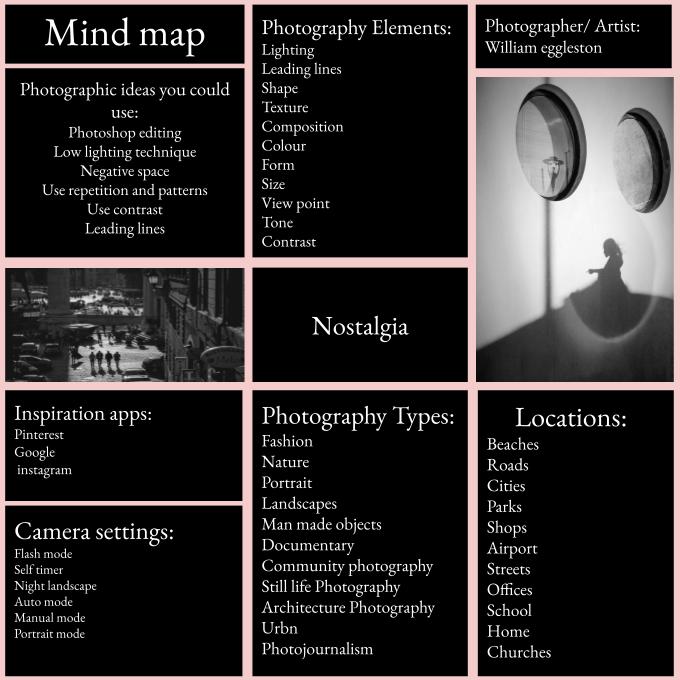











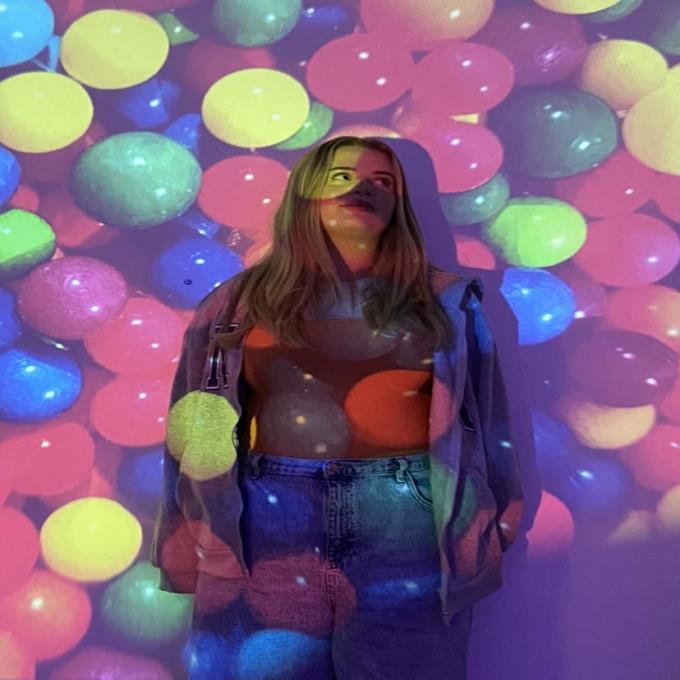
Photography Quiz
Introduction to A-level Photography Quiz
Q1: What is the etymology (origin & history) of the word photography?

20sec
Writing with light.
Q2: What year was the first photograph made in camera?

20sec
1826 (Joseph Nicéphore Niépce)
Q3: When did the first photograph of a human appear?

20sec
1838 (Louis-Jacques-Mandé Daguerre)
Q4: Who made the first ‘selfie’

20sec
Robert Cornelius (1839)
Q5: When did the first colour photograph appear?

20sec
1861 (James Clerk Maxwell)
Q6: What do we mean by the word genre?

20sec
A creative process in art
Q7: What do we mean by the genre of still-life?

20sec
An image that shows inanimate objects from the natural or man-made world.
Q8: What was the main purpose of the Pictorialist movement?

20sec
To affirm photography as an art form
Q9: How do we describe the term documentary photography?

30sec
Staging images for maximum effect.
Q10: What is exposure in photography?

20sec
The amount of light that reaches your camera’s sensor.
Q11: What controls exposure on your camera?

30sec
Aperture, shutter speed, ISO.
Q12: What control on our camera records moving objects?

Shutter
Q13: How do we explain depth of field?

20sec
How much of your image is in focus.
Q14: What factors affect Depth of Field?

30sec
Lens aperture, distance from camera to subject, and lens focal length.
Q15: What is composition in photography?

20sec
The arrangement of visual elements within the frame.
Q16: What is your understanding of aesthetics in art?

30sec
Concerned with the nature of beauty and taste.
It is subjective and in the eye of the beholder.
Aesthetic qualities refer to the way and artwork looks and feels.
Making a critical judgement based on observation and understanding.
Q17: What are contextual studies in photography?

30sec
To provide historial, cultural and theoterical understanding of images.
Consider factors outside of the image, as well as inside the frame.
Q18: How many images are captured on average every day worldwide?

4.7 billion
Q19: Which portrait is the most reproduced in the world?

The Queen (Elizabeth II)
Lauren Hodgson






